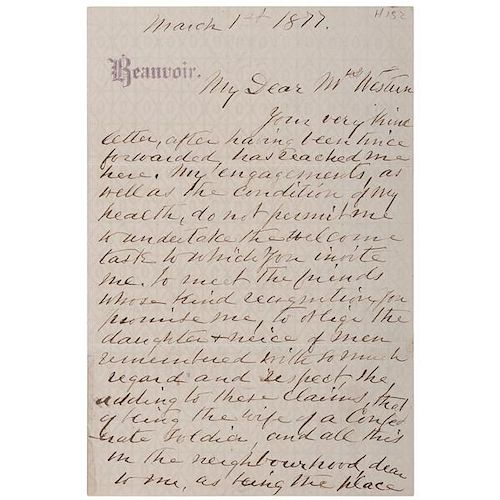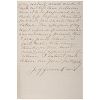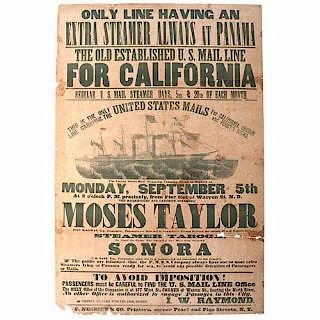Jefferson Davis, Autograph Letter Signed on Beauvoir Stationery, March 1877
About Seller
6270 Este Ave.
Cincinnati , OH 45232
United States
With offices in Cincinnati, Cleveland and Denver, Cowan’s holds over 40 auctions each year, with annual sales exceeding $16M. We reach buyers around the globe, and take pride in our reputation for integrity, customer service and great results. A full-service house, Cowan’s Auctions specializes in Am...Read more
Two ways to bid:
- Leave a max absentee bid and the platform will bid on your behalf up to your maximum bid during the live auction.
- Bid live during the auction and your bids will be submitted real-time to the auctioneer.
Bid Increments
| Price | Bid Increment |
|---|---|
| $0 | $25 |
| $500 | $50 |
| $1,000 | $100 |
| $2,000 | $250 |
| $5,000 | $500 |
| $10,000 | $1,000 |
| $20,000 | $2,500 |
| $50,000 | $5,000 |
| $100,000 | $10,000 |
About Auction
Jun 10, 2016 - Jun 11, 2016
Cowan's Auctions dawnie@cowans.com
- Lot Description
Jefferson Davis, Autograph Letter Signed on Beauvoir Stationery, March 1877
Davis, Jefferson (1808-1889). President of the Confederacy (1862-1865) and US Secretary of War (1853-1857). ALS, 2pp, 4.75 x 7 in. Beauvoir (MS). March 1, 1877. To Mrs. Western, who had invited him to an event in Fairview, KY, where Davis was born. My engagements, as well as the condition of my health, do not permit me to undertake the welcome task to which you invite me. To meet the friends whose kind recognition you promise me, to oblige the daughter & neice [sic] of men remembered with so much regard and respect, she adding to these claims that of being the wife of a Confederate soldier, and all this in the neighbourhood dear to me, as being the place of my nativity, would render the task not less than welcome were it to be performed in a cause less blessed than that for which you invite me to labour. Today a monument stands in Fairview to honor Davis' birthplace.
After the collapse of the Confederacy, Jefferson Davis (1808-1889) was hunted down and captured on May 10 by Union soldiers in Irwin County, GA, just days after dissolving the cabinet and Confederate government in Washington, GA. There had been various plans discussed to move the government to Cuba, or Canada, to reform and govern the Trans-Mississippi parts of the Confederacy, which were still in the hands of secessionists, but it appears that none of the various proposals were acted upon. Davis was imprisoned at Fortress Monroe, in irons in a dark, cold casemate. The harsh conditions affected his health, from which he never really recovered.
After General Miles, in charge of Fortress Monroe at the time of Davis' imprisonment, was transferred, his treatment improved slightly, and his family was permitted first to visit, then to move in with him into an apartment in the officers' quarters. But his term in prison stretched to two years while the Federal government debated whether or not to try him for treason. When no decision could be reached, he was finally released.
After this, he spent time as president of Carolina Life Insurance, but turned down the opportunity to become president of the Agriculture and Mechanical College of Texas (later Texas A & M). All this time there was also debate about ownership of Brierfield plantation, Davis' prewar home (the land had belonged to his brother, Joseph, but Jeff had been allowed to develop the plantation).
In 1877 widow Sarah Anne Dorsey heard of his problems and invited him to move to her estate, Beauvoir, in Biloxi, MI. Initially he and his family had their own cabin (by then only his wife, Varina, and daughter, Winnie). It is possible that this letter dates from those early days at the estate, before the family had all of their possessions moved in, and Davis even had to borrow stationery. At the beginning of the letter he tells Mrs. Western that her letter "having been since forwarded, has reached me here," suggesting he had only just arrived there himself.
Mrs. Dorsey was helping him with his writing (in part through editing and encouragement), which was published in 1881 as The Rise and Fall of the Confederate Government. At some point, the Davis family moved into the main house. Mrs. Dorsey became ill the following year and changed her will, leaving the estate to Davis.
It seemed to be only after the publication of the book that Davis again started reaching out to the public, attending "Lost Cause" events and accepting speaking engagements. He also completed another book, A Short History of the Confederate States of America (1889). On its completion, he decided to visit Brierfield. He was caught in a winter (November) storm and developed bronchitis. Somewhat ironically, he also contracted malaria. He and Varina stayed with Charles Fenner in New Orleans, and Davis appeared to be recovering. But he took a sudden turn for the worse and died early December 6. He was initially buried in New Orleans, but later Varina had him moved to Richmond.
Bessie E. Johnston Gresham Collection of Confederate Manuscripts, Photographs, & Relics
Lots 89-115
Bessie E. Johnston Gresham was born in Baltimore, MD in 1848 in a home sympathetic to the Southern cause. Union forces imprisoned one of her brothers for aiding the South, and her brother Elliott was a Confederate officer who lost a leg at the battle of Antietam. She became an ardent and unreconstructed Confederate, and, in 1887, she married Thomas Baxter Gresham, a Confederate veteran from Macon, GA. She was actively involved in the Baltimore chapter of the United Daughters of the Confederacy, and amassed a notable collection of Confederate manuscripts, photographs, and relics at the Gresham home at 815 Park Avenue in Baltimore. Most of her items were left to the Museum of the Confederacy, the Maryland Historical Society, and other institutions. This important collection of Johnston-Gresham family and Confederate-related material, was passed down through Bessie Johnston Gresham’s step-son, Leroy Gresham, before it was acquired by the consignor.
The collection features over 50 CDVs accumulated by Bessie and Thomas Gresham, offered as Lots 89-100. Some are wardate, and others were apparently acquired in Baltimore soon after the war's end. Some CDVs include patriotic inscriptions and quotations written by Bessie on reverse, which showcase her deep feeling of love and devotion to the Southern Cause.
In a June 1862 letter delivered through the Union blockade, Elliott Johnston, serving as aide-de-camp to CSA General Richard B. Garnett, mentioned collecting photos of CSA generals for his then 14-year-old sister Bessie.
In a 1926 issue of Confederate Veteran magazine, a memorial essay described Bessie's girlhood during the war:
"One of her brothers, who was on General Ewell’s staff, suffered the loss of a leg at the battle of Sharpsburg; her two other brothers were active Southern sympathizers and were under constant surveillance by Federal authorities for giving all possible aid to the Confederacy; her home was a center from which radiated help. “
"Reared in this atmosphere of deep love for our ‘cause,’ she became an ardent and unreconstructed Confederate. "
During her girlhood, Bessie was acquainted with many Southern generals and received from them letters, photographs, and autographs, as well as a number of gifts.
Provenance: Property of Another ConsignorMinor soil on verso of last page. Folds as expected. Small tape reinforcements of two folds in the lower portion of the letter. Ink is still dark and clear.Condition
- Shipping Info
-
SHIPPING. At the request of the buyer, Cowan's will authorize the shipment of purchased items. Shipments usually occur within two weeks after payment has been received. Shipment is generally made via UPS Ground service. Unless buyer gives special instructions, the shipping method shall be at the sole discretion of Cowan's Auctions, Inc.. Cowan's is in no way responsible for the acts or omissions of independent handlers, packers or shippers of purchased items or for any loss, damage or delay from the packing or shipping of any property.
-
- Buyer's Premium



 EUR
EUR CAD
CAD AUD
AUD GBP
GBP MXN
MXN HKD
HKD CNY
CNY MYR
MYR SEK
SEK SGD
SGD CHF
CHF THB
THB












